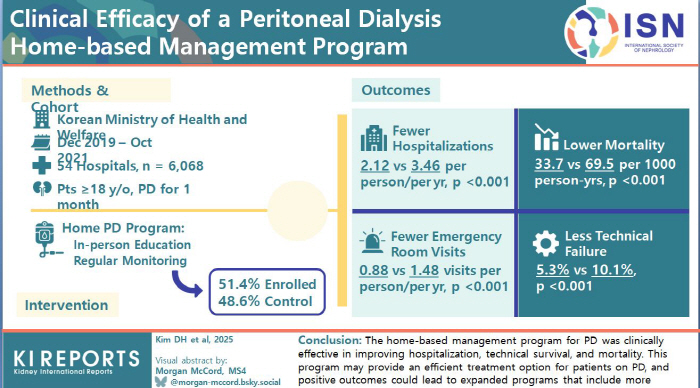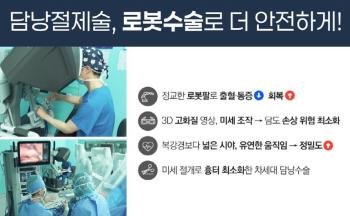Effective at-home medical pilot project for peritoneal dialysis patients...Lower hospitalization, emergency room use, and mortality
Sep 24, 2025
A study found that the government's 'home medical pilot project for peritoneal dialysis patients' implemented since December 2019 is effective in reducing medical use and improving treatment outcomes. In addition to hospitalization, overall medical resources have decreased from emergency room use to hemodialysis conversion, and the mortality rate has also decreased, drawing attention to whether it can be adopted as a basis for policy change.
The Korean Society of Kidney (Chairman Park Hyung-cheon, Yonsei University) recently announced that professors Kim Do-hyung and Lee Young-ki of the Department of Nephrology at Hallym University, Seoul National University, Korea University, Konyang University, Kosin University, and Dongguk University have published an evaluation of the effectiveness of the home medical pilot project for peritoneal dialysis patients in Kidney International Report
This study analyzed the data requested by the Health Insurance Review and Assessment Service and compared 3,127 people who participated in the pilot project with 2,959 who did not participate. As a result, the average hospitalization of peritoneal dialysis patients who participated in home care was 2.12 cases, which was 60% of non-participants (3.46 cases). The average number of hospitalization days per person was 6.8 days, about 1 day less than the 8.7 days of non-participants.
Medical use in emergency rooms has also decreased markedly. The average number of emergency room days of home care participants was 0.88, which was 60% of the non-participants (1.48 cases). Hemodialysis conversion due to peritoneal dialysis failure also showed a big difference. The hemodialysis conversion rate of patients participating in home care was 5.3%, which was only half of that of non-participants (10.1%), and the risk of peritoneal dialysis failure of non-participants was 1.7 times higher than that of participating patients.
The most important thing to note is the reduction of mortality. Approximately 7% of patients died during the study period, with an annual mortality rate of 33.7 per 1000 patients participating in home care, half lower than that of non-participants (69.5 patients).
Professor Lee Young-ki, Director of Research, explained that "end-stage renal failure is a rapidly increasing chronic disease, and peritoneal dialysis has high socioeconomic value, such as reducing productivity loss due to fewer hospital visits and travel times compared to hemodialysis, and alleviating the burden on caregivers."Peritoneal dialysis home care suggests that patient prognosis can be improved through preventive health care and early intervention."
Park Hyung-cheon, Chairman of the Korean Society of Nephrology, said, "This study is an important achievement that objectively shows the effect of reducing national medical expenses while improving the quality of life of patients with peritoneal dialysis." The society will work closely with the Ministry of Health and Welfare to expand the patient-centered treatment environment and do its best to establish the system."
Since 2019, the Ministry of Health and Welfare has been gradually expanding the home medical pilot project, and the project for patients with peritoneal dialysis was the first of the home medical pilot projects. This study is expected to be used as empirical data to support the feasibility of converting the pilot project to the main project.
The Korean Society of Kidney (Chairman Park Hyung-cheon, Yonsei University) recently announced that professors Kim Do-hyung and Lee Young-ki of the Department of Nephrology at Hallym University, Seoul National University, Korea University, Konyang University, Kosin University, and Dongguk University have published an evaluation of the effectiveness of the home medical pilot project for peritoneal dialysis patients in Kidney International Report
This study analyzed the data requested by the Health Insurance Review and Assessment Service and compared 3,127 people who participated in the pilot project with 2,959 who did not participate. As a result, the average hospitalization of peritoneal dialysis patients who participated in home care was 2.12 cases, which was 60% of non-participants (3.46 cases). The average number of hospitalization days per person was 6.8 days, about 1 day less than the 8.7 days of non-participants.
Medical use in emergency rooms has also decreased markedly. The average number of emergency room days of home care participants was 0.88, which was 60% of the non-participants (1.48 cases). Hemodialysis conversion due to peritoneal dialysis failure also showed a big difference. The hemodialysis conversion rate of patients participating in home care was 5.3%, which was only half of that of non-participants (10.1%), and the risk of peritoneal dialysis failure of non-participants was 1.7 times higher than that of participating patients.
The most important thing to note is the reduction of mortality. Approximately 7% of patients died during the study period, with an annual mortality rate of 33.7 per 1000 patients participating in home care, half lower than that of non-participants (69.5 patients).
Professor Lee Young-ki, Director of Research, explained that "end-stage renal failure is a rapidly increasing chronic disease, and peritoneal dialysis has high socioeconomic value, such as reducing productivity loss due to fewer hospital visits and travel times compared to hemodialysis, and alleviating the burden on caregivers."Peritoneal dialysis home care suggests that patient prognosis can be improved through preventive health care and early intervention."
Park Hyung-cheon, Chairman of the Korean Society of Nephrology, said, "This study is an important achievement that objectively shows the effect of reducing national medical expenses while improving the quality of life of patients with peritoneal dialysis." The society will work closely with the Ministry of Health and Welfare to expand the patient-centered treatment environment and do its best to establish the system."
Since 2019, the Ministry of Health and Welfare has been gradually expanding the home medical pilot project, and the project for patients with peritoneal dialysis was the first of the home medical pilot projects. This study is expected to be used as empirical data to support the feasibility of converting the pilot project to the main project.
|
This article was translated by Naver AI translator.














